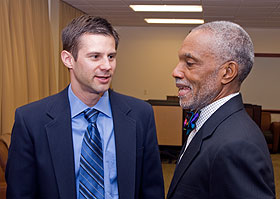  |
| HOME | THIS ISSUE | CALENDAR | GRANTS | BACK ISSUES | < BACK | NEXT > |
Survey aims to gather student reaction to school choice programsby Beth Krane - December 3, 2007 | ||||
| When the landmark Hartford school desegregation case Sheff v. O’Neill returned to court last month, it gave educators, parents, and politicians in the city and surrounding suburbs a chance to air their views on the progress and pitfalls associated with school choice programs. A three-year, $300,000 research project currently under way at the Neag School of Education’s Center for Education Policy Analysis aims to give voice to another group at the heart of the school desegregation debate yet seldom heard: the students themselves. The Center for Education Policy Analysis, formed three years ago, focuses on studying the impact of a wide range of school choice programs designed to promote voluntary school desegregation. As part of its project for the Connecticut State Department of Education’s Bureau of Choice Programs, the Center is conducting a survey sampling thousands of elementary, middle, and high school students enrolled in the state’s 54 inter-district magnet schools, 16 charter schools, and the Open Choice program. The decades-old Open Choice program has the goal of making 1,600 seats available each year in suburban classrooms for Hartford students. The survey, piloted in a handful of high schools this fall and set to be administered widely in elementary, middle, and high schools in the spring, examines students’ attitudes on a variety of reported benefits of integrated school settings, including improved racial attitudes, relationships with peers and teachers of all backgrounds, a sense of belonging, and engagement with studies. “Connecticut has invested heavily in choice programs and we are trying to gather evidence that may speak to the returns on those investments,” says Casey Cobb, the Center’s director and an associate professor of educational leadership. “Students are the ones directly experiencing these policies, so it makes sense to ask them.”
A second component of the Center’s project for the Department of Education is an analysis that will compare the standardized test scores of students selected by lottery for the Open Choice program and a sample of inter-district magnet schools with the scores of students who applied for Open Choice and magnet lotteries but were not selected. The achievement analysis will encompass student math and reading scores from the Connecticut Mastery Test, administered in grades 3 through 8, and the Connecticut Academic Performance Test, administered in grade 10, from the 2005-2006 and 2006-2007 school years. In a separate initiative, the UConn Center has forged a relationship with the Magnet Schools of America, a national association concerned by the dearth of substantive research being conducted on magnet schools nationwide. On Nov. 28 and 29, the Center for Education Policy Analysis hosted a conference, “Public School Choice in a Post-Desegregation World,” that brought together the nation’s top school choice researchers. Cobb hopes it will be a first step in creating a national consortium of researchers focused on school choice issues. |
| ADVANCE HOME UCONN HOME |

